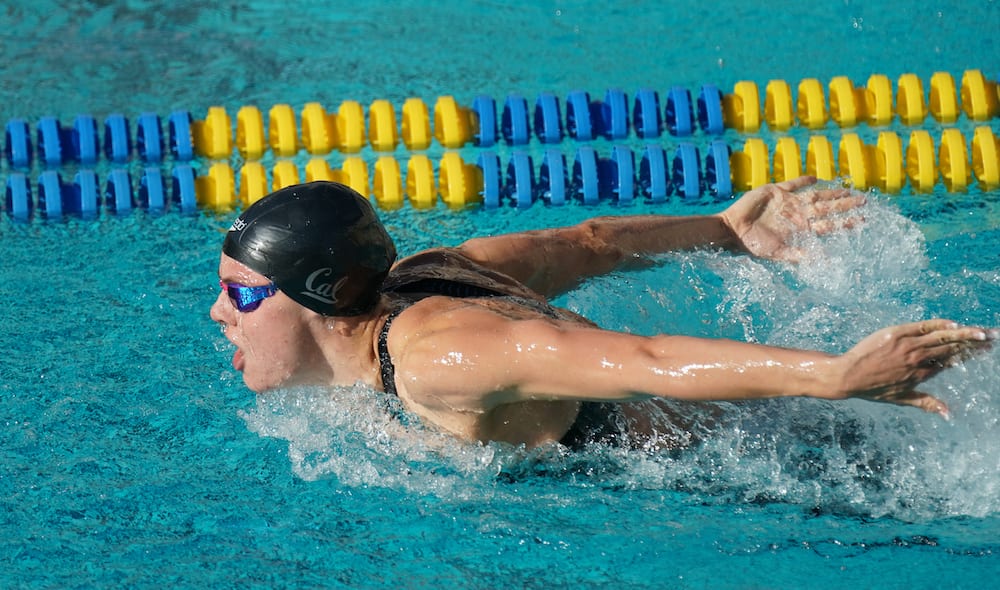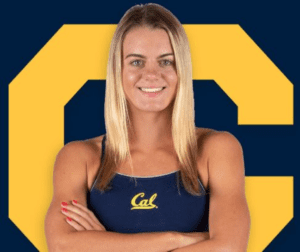Perhaps no one is more surprised that swimmer Alicia Wilson, BS 22, will be competing in the Olympics than Alicia Wilson herself. When the rising senior from England first joined the Cal swim team, she says she was nowhere near the fastest, placing herself toward the bottom of the pack. But a breakout freshman year followed by an even better sophomore year changed her perspective. “The Olympics have always been a dream of mine but never a goal,” she says. “And then my sophomore year the momentum kept going and I thought, ‘Wow, I could actually do this.’”

Alicia Wilson,Free/IM
She attributes her success largely to Coach Teri McKeever, who encourages unconventional training, like taking gymnastics or dance to work different muscles. The result for Wilson was a lifetime best in the 200-yard individual medley, a technically challenging race involving equal parts backstroke, butterfly, breaststroke, and freestyle, in the 2021 season—a record she then broke in her Olympic trials (for the 200-meter IM) to earn a spot on Great Britain’s team heading to Tokyo.
We caught up with Wilson while she was at a national training facility in England, days before she heads to Tokyo.
The individual medley is arguably the most challenging in swimming. What’s the secret to being good at it?
It takes a lot of versatility, because you’re obviously changing strokes and muscle groups—about every 30 seconds for the 200-meter. It’s like a sprint, and you can’t really afford to have a weak stroke. But it’s quite refreshing that I don’t have to do the same thing every day. I can mix up my strokes or if I’m having a bad day on one of them, I have the luxury to then try and improve somewhere else. Just being flexible is huge with the IM.
It’s like a sprint, and you can’t really afford to have a weak stroke
How do you prepare mentally?

Staying focused on myself is something that I’m really working on. In the UK, I’m very aware of the people I race because I’ve raced them for 12 years and I know people’s strengths. I’m starting to get that same familiarity in the U.S. But at the Olympics, I’m generally not going to understand who’s good at what. As much as [IM swimmers] try to not have a weak stroke, you’re going to have one of the four that you don’t favor. There will be a length where I’ll be behind or ahead and that’s how it goes. In the end, it’s who touches the wall first.
Most people are lucky to be good at one or two things. How do you go about becoming skilled—and staying competitive—at four different strokes?
I tap into the ethos of [Coach] Teri McKeever. She’s all about innovating yourself to become a better swimmer and a better athlete and person. I embraced that more than ever this year and having an extra year because of COVID has allowed me to get better. Since coming to Cal, I’ve also had a lot of fun racing teammates who specialize in each stroke. Trying to keep up with them has helped me improve on each of my individual strokes so that when it comes together, it’s a lot stronger.
How do you keep mitigate stress as the Olympics get closer?
I’m really lucky that Teri is on the U.S. Olympic team as a coach. Knowing that I’ll have my Olympic debut with my coach there, even though she’s from another country, is going to be very special. That keeps me level-headed. And I try to do stuff that I enjoy when I’m not at the pool. It’s really important for me to unwind because it’s just so intense, those periods of training. I’m a dog person and love spending time with my dogs—two Bernese mountain dogs and a Labrador. Apparently you walk a lot in the Olympic village, so my mom and I have been taking a lot of dog walks.
What does it mean to you to represent your country in the Olympics?
My inspiration started in 2012 when the London Olympic games were literally on my front doorstep—the cyclers passed my house. I was definitely star-struck seeing all the different athletes and that fueled me to take swimming a little more seriously. I can’t quite believe that I get to be the person whom I looked up to when I was 12. And it means even more given the pandemic. Last year was probably the toughest of my life. So to have that dream and then the past year combined, it’s hard to put into words because it means so much.
My inspiration started in 2012 when the London Olympic games were literally on my front doorstep—the cyclers passed my house.
What life lessons have elite competitive swimming taught you?
I think the biggest one is the value of honesty and support. I struggled this year, and had I not had support at Cal and from the Haas faculty I would definitely have not gotten through to where I am now. I just wish I had voiced my need for help a lot sooner, because once you do it opens up so much more and everything’s a lot easier with a team behind you, obviously. Learning to communicate better has been a lifeline to me. I’m so lucky to have the community at Berkeley that has lifted me up and allowed me to get to where I am.
Qualifying heats for Wilson’s event, the 200-meter IM, will be Monday, July 26, starting at 7:00 p.m. Japan Time (3:00 a.m. PT on July 26). Semifinals for the event will be held Tuesday, July 27, starting at 10:30 a.m. JT (6:30 p.m. PT on July 26). The finals will be Wednesday, July 28, starting at 10:30 a.m. JT (6:30 p.m. PT on July 27).